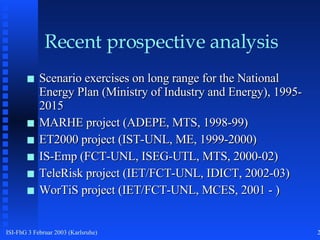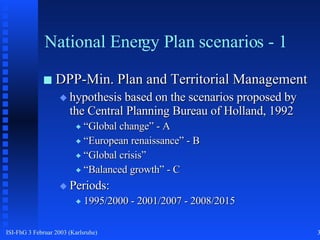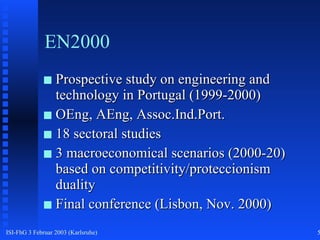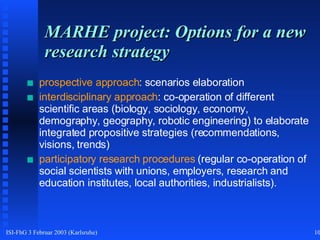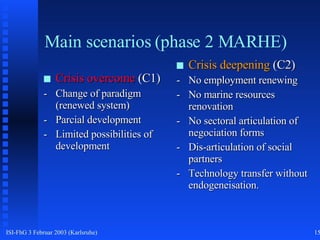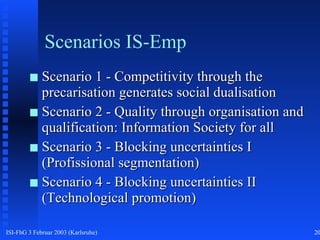Delphi Pt, Isi(2003)
- 1. Delphi exercises in Portugal : cases from the fisheries sector, information society & employment and telework AntĂłnio BrandĂŁo Moniz (Associate Professor at FCT-UNL) [email_address]
- 2. Recent prospective analysis Scenario exercises on long range for the National Energy Plan (Ministry of Industry and Energy), 1995-2015 MARHE project (ADEPE, MTS, 1998-99) ET2000 project (IST-UNL, ME, 1999-2000) IS-Emp (FCT-UNL, ISEG-UTL, MTS, 2000-02) TeleRisk project (IET/FCT-UNL, IDICT, 2002-03) WorTiS project (IET/FCT-UNL, MCES, 2001 - )
- 3. National Energy Plan scenarios - 1 DPP-Min. Plan and Territorial Management hypothesis based on the scenarios proposed by the Central Planning Bureau of Holland, 1992 “ Global change” - A “ European renaissance” - B “ Global crisis” “ Balanced growth” - C Periods: 1995/2000 - 2001/2007 - 2008/2015
- 4. National Energy Plan scenarios - 2 Scenarios % anual growth of GDP (2008/15) A 2,0% B 2,6% C 2,9% ----------- Labour productivity (GDP/employment) 1995 2000 2007 2015 A 3316 3854 4518 5356 B 3316 3967 4968 6333 C 3316 4023 5063 6498
- 5. EN2000 Prospective study on engineering and technology in Portugal (1999-2000) OEng, AEng, Assoc.Ind.Port. 18 sectoral studies 3 macroeconomical scenarios (2000-20) based on competitivity/proteccionism duality Final conference (Lisbon, Nov. 2000)
- 6. Phases of ET2000 A - Analysis of trends, main products and knowledge demands (diagnosis) B - Scenarios: products and challenges. SWOT analysis. Knowledge role. C - Strategies and options. Priorities Source: V. Tavares: Engenharia e Tecnologia 2000 , Lisboa, 2001
- 7. Technology foresight and policy The foresight exercises were developed as tools for economical planning policies EN2000 was an aggregation of reports on several topics of engineering trends and needs, as the main element for a technological development There are until now no S&T policy foresight exercises This policy as been casuistic, dependent on academic lobbyings on political structure
- 8. Technology and Delphi exercises EC programmes on R&D helped the internacionalisation of Portuguese research activities and technological development Forecasting technological changes is not seen as important for options and choices at political and economical levels New Delphi exercises held after ASTPP network (reference to British, French and German cases) These exercises were integrated in R&D projects and focused on specific sectors.
- 9. Sectoral Delphi exercises Fisheries socio-economical system (MARHE): fisheries, aquaculture, shipbuilding, manufacturing, commerce Information society and employment (IS-Emp) Telework, labour relations and working conditions (TeleRisk) The futures of automobile industry (WorTiS)
- 10. MARHE project: Options for a new research strategy prospective approach : scenarios elaboration interdisciplinary approach : co-operation of different scientific areas (biology, sociology, economy, demography, geography, robotic engineering) to elaborate integrated propositive strategies (recommendations, visions, trends) participatory research procedures (regular co-operation of social scientists with unions, employers, research and education institutes, local authorities, industrialists).
- 11. MARHE research techniques (surveys) Delphi survey : around 50 respondents representative of social actors, expertises, geographical regions; Survey to youth attitudes applied to 1200 people from all main fisheries communities in Portugal; quality management survey for production industries (around 40 firms); R&D infrastructure survey (with semi-directive interviews)
- 12. Scenarios (phase 1 MARHE)
- 13. Phase 1 of MARHE-Delphi Experts panel with 90 members Questionnaire with 58 scenario themes Survey on May 97 to those experts 35 validated answers Public presentation of results (Seminars MARHE, Out 97 and Dec 98, Peniche )
- 14. Phase 2 of MARHE-Delphi 15 themes considered as most important (main variables) by the panel Survey of 40 questionnaires (Jan 99) 26 expert answers (Mar 1999, presentation and debate at 3rd Seminar Peniche) Final report(Apr 1999)
- 15. Main scenarios (phase 2 MARHE) Crisis overcome (C1) - Change of paradigm (renewed system) - Parcial development - Limited possibilities of development Crisis deepening (C2) - No employment renewing - No marine resources renovation - No sectoral articulation of negociation forms - Dis-articulation of social partners - Technology transfer without endogeneisation.
- 16. IS-Emp Project IS-Emp 1 (The influence of information society on employment) IS-Emp 2 (The development of employment in the information society) MTS, Ministry of Labour and Solidarity, FCT-UNL and ISEG-UTL 1999 - 2001
- 17. IS-Emp 1 Experts panel with 250 members Questionnaire with 76 scenario themes Workshop (1999) to validate themes and methodology, Survey on 2000 to those experts 42 validated answers book - A.B. Moniz; I. Kovács (coords) Sociedade da Informação e Emprego , Lisbon, DGEFP-MTS, 2001, 264 pp.
- 18. IS-Emp 2 Experts panel with 60 members Questionnaire with _ scenario themes Workshop (2000) to validate themes and methodology, Survey on 2000 to those experts _ validated answers book - A.B. Moniz (coord) Futuros do emprego na sociedade da informação , Lisbon, DGEFP-MTS, 2002, 264 pp.
- 19. Invariants Economical structure based on the diversity of productive specialisation Low average level (at European scale) of labour qualification Political promotion of Information Society Stable structure of unemployment Strong investiment on technology during 90’s Modernisation of enterpreneurial organisaion mechanisms Lack of traditino on inter-institutional co-operation (associations, state, R&D, companies) Labour market regulated
- 20. Scenarios IS-Emp Scenario 1 - Competitivity through the precarisation generates social dualisation Scenario 2 - Quality through organisation and qualification: Information Society for all Scenario 3 - Blocking uncertainties I (Profissional segmentation) Scenario 4 - Blocking uncertainties II (Technological promotion)
- 21. TeleRisk Telework, labour relations and occupational risks IDICT-Institute for Working Conditions, Ministry of Labour and Solidarity case studies in software, metal engineering and textile industries
- 22. Phase 1 TeleRisk project state-of-the-art report (2002) 24 scenario themes 42 experts panel event period: 2003 - 2025 Workshop with the panel (Jan. 2003) survey application (Feb. 2003)
- 23. Next exercises WorTiS project on “Work systems, Time and Space in Automobile Industry” FCT-UNL and CEG-FLUL 3 research teams (sociology, history and geography) 1st Delphi round to start on March 2003 Proposal for a global S&T foresight

![Delphi exercises in Portugal : cases from the fisheries sector, information society & employment and telework AntĂłnio BrandĂŁo Moniz (Associate Professor at FCT-UNL) [email_address]](https://image.slidesharecdn.com/delphipt-isi2003-1216633613653768-8/85/Delphi-Pt-Isi-2003-1-320.jpg)
